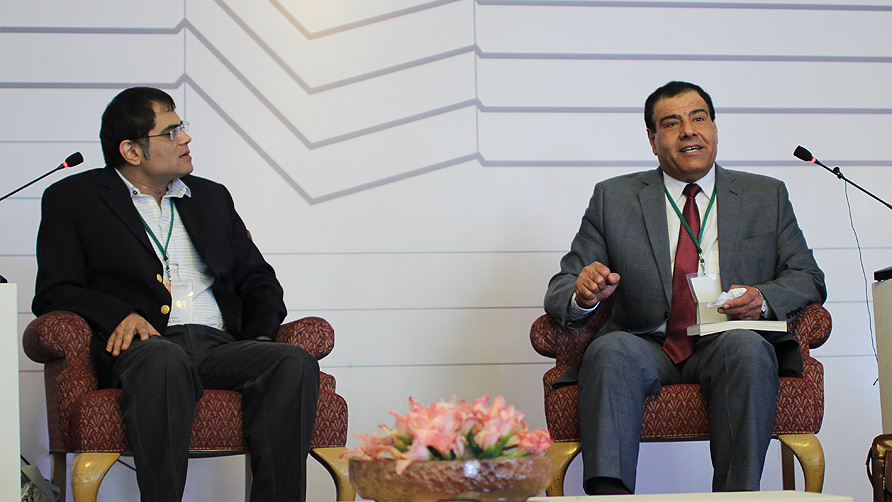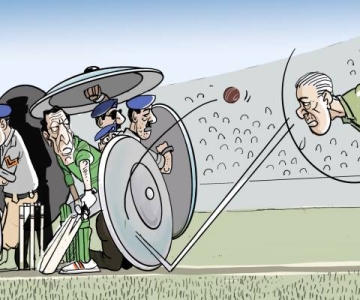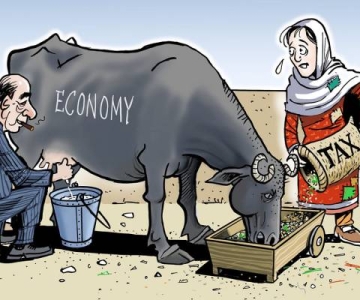The third Karachi Literature Festival concluded recently. I am posting a short piece of mine which was published by the News on Sunday. Another report that I wrote for TFT can be found here.
Faiza S Khan’s review is most interesting. Another review by Umair found it sterile and comments on the technocratic discussions that took place on ‘national’ issues. And a comprehensive round up at DAWN’s Books & Authors magazine here.
“When our lives are written about in the English language, the books become best sellers”, thundered Pakistan’s rebel poet Kishwar Naheed at the Karachi Literature Festival. This was a session where I had the rather undeserved honour of introducing and talking to Naheed and the other master poet, Iftikhar Arif. She added that there was little emphasis on quality as the books you were supposed to buy at the airports for light reading were now ‘high’ literature. This was an oblique, yet unambiguous reference to the Pakistani writing in English. The two worlds – ‘native’ and English – remain quite separate in a manner that Kipling had envisioned. English writing from Pakistan has received global attention and is celebrated at festivals across the globe. Yet how many Pakistanis have an idea of what it is all about? This is an uncomfortable question that we need to ask and perhaps keep on asking.The Karachi Literature Festival has now evolved into a serious annual festival where writers gather and interact with thousands of readers each year. To be fair to the organisers, they have been mindful of the principle of inclusiveness from the very start. Asif Farrukhi, an eminent writer (who is my actual role model for his supernatural powers to write, edit and think with a full time job) has been organising the ‘regional’ side of the literary ramblings at the festivals. Big names such as Fahmida Riaz and others are given due acknowledgment by holding sessions with them. Yet, the emphasis, for obvious reasons, is on the universe of English writings – both by Pakistanis and foreigners. This year, Vikram Seth, William Dalrymple, Hanif Kureishi, Shobha De, Anatol Lieven and several others attracted much attention by their readers, fans and critics. There were a few sessions on Urdu and regional languages’ literature but it was obvious that the attendees were not always the same.
As a young woman confessed at the festival, “I hardly read Urdu, but do you consider Initizar Husain a great writer?” Despite the shocking nature of this statement, I was hardly surprised. The apartheid that exists in Pakistan’s education system marginalises the local and the vernacular compared to the more market-oriented, global English. Aside from its potential ‘benefits’, English language, for some, remains an odious status symbol. A colonial legacy, a preserve of the postcolonial elites, and a stepping-stone for entry into the deliberately constructed, globalised monoculture.
But Khaled Ahmed raised the issue of how Urdu was also becoming redundant due to its idiom and the constraints on expression in contemporary Pakistani society. He lamented the fact that Urdu writers could not say many things, which the English fiction writers could express due to the inaccessibility of these works locally. Khaled is not off the mark here. Local literature is far more likely to attract the ire of state and non-state actors. This process started with Manto in the early years of Pakistan where he had to face several court cases for writing ‘obscene’ literature. Today, Manto is considered as the greatest of modern Urdu storytellers. Not long ago Ahmed Bashir had to face cases against him for having attacked Mullahs and their shenanigans in his writings. Tragic as it was not many lawyers were willing to take the case and in fact one of the known senior left wing leaders remained ambivalent about helping Bashir. However, this has not impacted the creativity much as voices of resistance continue to map literature in Pakistani languages and there is no dearth of what one would rate as high quality literary output.
On the other hand, translations of Pakistani English writers have not yet appeared for local readers. Thus the vast majority of Pakistanis have little clue as to what Mohsin Hamid’s protagonist underwent in the US or what were the travails of Hanif’s Alice Bhatti. The gap widens despite the pushes and pulls of globalisation. The Karachi Literature Festival is ideally suited to play a major role in bridging these divides of language and cultures. Over the last three years, the festival has taken conscious steps to include local voices but there is a long way to go.
Fahmida Riaz, as a rare blend of the two worlds, asked Vikram Seth if he had read Qurratulain Hyder; and told Hanif Kureishi how she translated two of his stories years ago and loved his work. As writers’ moods go, she could not suppress her views when we met after the closing ceremony. Riaz used the rather strong term ‘cultural imperialism’ for the overt focus on English. In one of the sessions earlier she mentioned how Orhan Pamuk always wrote in his native language but had good translators for a global audience. Riaz remains a romantic revolutionary; she even remarked that Sindhi was the local language of the place where the festival was being held.
Amid these perennial, unresolved debates Intizar Hussain was constructive and forward-looking. In various sessions, he opined that Urdu and regional literatures were flourishing in the country and there was no need for despondency. Inspired by his deep understanding of the mythological moorings of our existence, he said it was too early to write off Urdu literary tradition in Pakistan. English writings could only benefit from this tradition and look up to it.
Raza Rumi was a moderator at KLF, 2012 and his writings are archived at www.razarumi.com



